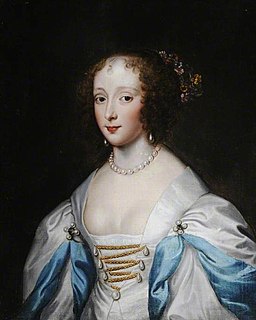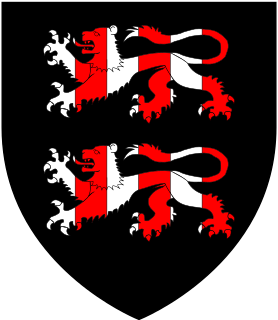Henry Bayntun (1621–1672) was an English politician who sat in the House of Commons between 1661 and 1672.

The House of Commons of England was the lower house of the Parliament of England from its development in the 14th century to the union of England and Scotland in 1707, when it was replaced by the House of Commons of Great Britain. In 1801, with the union of Great Britain and Ireland, that house was in turn replaced by the House of Commons of the United Kingdom.
Bayntun was the son of Sir Edward Bayntun of Bromham, Wiltshire and his first wife Elizabeth Maynard, daughter of Sir Henry Maynard of Eaton, Essex. [1] and was baptised on 14 November 1621. He matriculated at St John's College, Oxford on 7 December 1638, aged 14. [2] He travelled abroad from 1640 to 1643 and was a captain of horse in the Royalist army from 1643 to 1644. [3]
Sir Edward Bayntun (1593–1657) was an English politician who sat in the House of Commons variously between 1614 and 1653.

Sir Henry Maynard (1547–1610) was an English politician and secretary to Lord Burghley, and became a substantial landowner.

St John's College is a constituent college of the University of Oxford. Founded as a men's college in 1555, it has been coeducational since 1979. Its founder, Sir Thomas White, intended to provide a source of educated Roman Catholic clerics to support the Counter-Reformation under Queen Mary.
In 1661, Bayntun was elected Member of Parliament for Chippenham for the Cavalier Parliament in a double return. He was allowed to sit on the merits of the return until the election was declared void a month later. He was then re-elected as MP for Chippenham. [3]

Chippenham is a parliamentary constituency, abolished in 1983 but recreated in 2010, and represented in the House of Commons of the Parliament of the United Kingdom. It elects one Member of Parliament by the first past the post system of election. The 2010 constituency includes the towns of Bradford on Avon, Chippenham, Corsham and Melksham.

The Cavalier Parliament of England lasted from 8 May 1661 until 24 January 1679. It was the longest English Parliament, enduring for nearly 18 years of the quarter-century reign of Charles II of England. Like its predecessor, the Convention Parliament, it was overwhelmingly Royalist and is also known as the Pensioner Parliament for the many pensions it granted to adherents of the King.
Bayntun died at the age of about 50 and was buried at Bromham on 10 November 1672. [3]
Bayntun married Joanna Trimnell daughter of Edmund Trimnell, yeoman, of Hanger, Bremhill, Wiltshire by 1653. They had a son Edward and two daughters and she died in 1675. Bayntun was the brother of Edward Bayntun and half-brother of Nicholas Bayntun. [3]
Sir Edward Bayntun was an English politician who sat in the House of Commons variously between 1640 and 1679.




